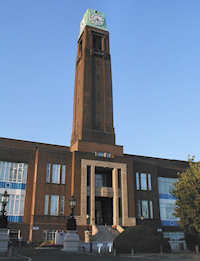Syon Lane
Syon Lane, Hounslow
A ‘London distributor road’, as it classified, connecting the grounds of west London’s finest stately homes, Syon House and Osterley Park House

Syon Lane formerly had several grand villas, including Wyke House, which became a private lunatic asylum in the 19th century, and the Duke of Marlborough’s Syon Hill. Sports grounds and their clubhouses now dominate the northern part of the lane, with football clubs on the west side and rugby clubs on the east. Beyond these are the compact Wyke Green and the much larger Wyke Green golf course, on the edge of Osterley Park.
Syon Lane is bisected by the A4 Great West Road at Gillette Corner and Brentford’s main business district lies east of this junction, near which there’s a Tesco superstore and a small shopping parade. Syon Lane station, on the Hounslow loop line, is located to the south-east.
Marked with a big pink pin on the map below, the Gillette factory was designed in 1937 by the relatively undistinguished architect Sir Banister Fletcher, when he was 71. Nikolaus Pevsner wrote dismissively of its “incongruous, timidly modernistic grandeur” – but it outshines most commercial structures. Since Gillette moved production to eastern Europe the building has lain empty and various grand plans for its future have repeatedly come to nothing.
The electoral ward of Syon covers an area between the railway line and the river. This is a diverse ward where residents are equally likely to be buying their home or renting it; to be single or married; and to have a degree or no qualifications at all. According to the 2011 census, 48 per cent of residents are white British and the next largest sub-groups are of Indian, black African and Polish origin.
